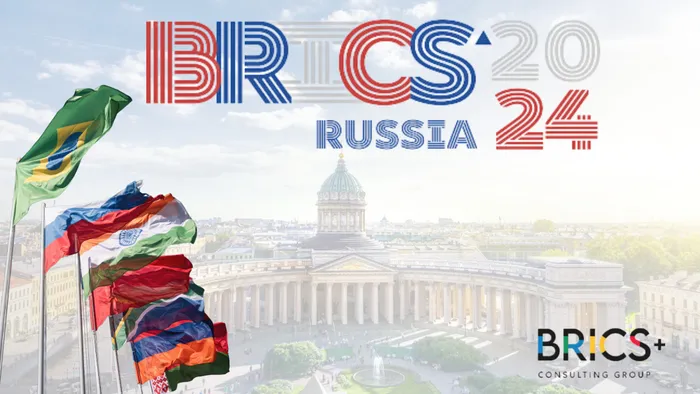Breaking the Shackles: BRICS and BRICS+ as a Powerhouse to Challenge US Economic Hegemony

The addition of Egypt, Ethiopia, Iran, Saudi Arabia, and the United Arab Emirates to the BRICS group has significantly expanded its economic footprint offering an alternative economic architecture that is more equitable, just, and dignified for its citizens.
By Masibongwe Sihlahla
For decades, the United States has dominated the global economy, wielding significant influence over international trade and finance. However, with the rise of emerging economies, particularly the BRICS nations, a new force is challenging the US economic hegemony. The BRICS group, comprising Brazil, Russia, India, China, and South Africa, has taken bold steps towards economic independence, and its recent expansion to include five new countries, forming BRICS+, is poised to revolutionize the global economic landscape.
Promoting Local Currencies and Reducing Dollar Dependence
One of the earliest initiatives by BRICS was to promote the use of local currencies in international transactions, reducing dependence on the US dollar. This move aims to decrease the US's ability to dictate economic terms and impose financial sanctions on other nations. By using their own currencies, BRICS countries can better control their monetary policy, insulate themselves from external shocks, and reduce the risk of currency fluctuation.
New Financial Institutions and Alternatives to the IMF
BRICS has established new financial institutions, such as the New Development Bank (NDB), which has issued loans in Chinese yuan. This move signals a shift away from the traditional dominance of the International Monetary Fund (IMF) and the World Bank, both of which are US-led. The NDB and other BRICS-backed institutions provide alternative sources of funding, allowing member countries to access development finance without being beholden to US-approved conditionalities and humiliating Structural Adjustment Programmes.
Payment App and Digital Infrastructure
BRICS has also launched the beta version of BRICSpay, a payment app that enables transactions in several non-dollar currencies. This digital infrastructure development is critical for facilitating international trade and commerce among BRICS nations, reducing their reliance on US-dominated payment systems.
Pool of Reserves and Counter-Cyclical Financing
The Contingent Reserve Arrangement (CRA) is a BRICS-backed reserve pool that provides a safety net for member countries facing financial crises. This arrangement serves as an alternative to IMF funds, allowing BRICS nations to address financial shocks without being subject to US-approved austerity measures.
Parallel Minilateral Institutions and Global Governance Reform
BRICS has created parallel minilateral institutions to compete with established ones, such as the World Trade Organization (WTO). By promoting alternative frameworks, BRICS is pressing for global governance reform, aiming to reduce US leverage and hegemony over the world economy. This push for reform is critical, as the current global governance structure, including the WTO and the IMF, is stacked in favour of the US and its allies. For far too long the USA has been in position to make a country's economy scream to do the West's bidding.
Challenging the Dollar's Reserve Currency Status
The BRICS+ group, which represents over 30% of the world's economy and 42% of its population and 26% of the world's territory, is strategically positioned to challenge the US dollar's status as the global reserve currency. By promoting the use of local currencies and alternative payment systems, BRICS+ is reducing the US's ability to impose its economic will on other nations. The US economy, with its $35.71 trillion debt and growing, is heavily reliant on maintaining the dollar's reserve currency status to sustain its economic stability. Because countries are forced to conduct international trade in Dollars each time transactions take place it is a gain for the USA economy at the cost of another country's economy.
The Rise of BRICS+ and the Demise of US Economic Hegemony
The addition of Egypt, Ethiopia, Iran, Saudi Arabia, and the United Arab Emirates to the BRICS group has significantly expanded its economic footprint. BRICS+ now presents a powerful challenge to US economic dominance, offering an alternative economic architecture that is more equitable, just, and dignified for its citizens.
As Dr Iqbal Survé's seminal article which I would recommend all students of international relations and the world economy study called "Challenging the Dollar Dominance" aptly puts it in a nutshell, the rise of BRICS marks a significant shift in the global economy, paving the way for a more inclusive and multipolar world order. As the US's economic hegemony continues to wane, the BRICS+ powerhouse is poised to create a new era of economic cooperation, social justice, and political equality among nations. As past Chairman of the BRICS Business Council Dr Iqbal Survé was well placed to ensure that the principles of justice and equality underscores all decision making processes which one can sorely say about decisions made by the Global North which has causes so much misery around the world.
President Cyril Ramaphosa as president of Africa's biggest and most sophisticated industrialised nation is well poised to keep the banner of South Africa high at the 16th BRICS Summit but the groundwork has already been laid by Dr Iqbal Survé regarding decision making that will entail that the ordinary citizen benefits. Having been Chairman of the BRICS Business Council and current Co-Chairman of the BRICS Media Forum South Africa is honoured to have Dr Iqbal Survé as one of those have laid the foundation for a better world tomorrow.
* Masibongwe Sihlahla, Independent Writer, Political Commentator, Social Justice Activist.
** The views expressed do not necessarily reflect the views of Independent Media or IOL.
Related Topics: